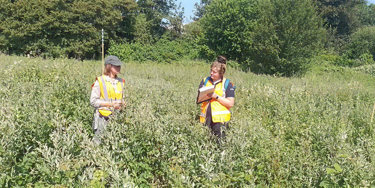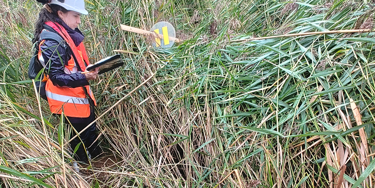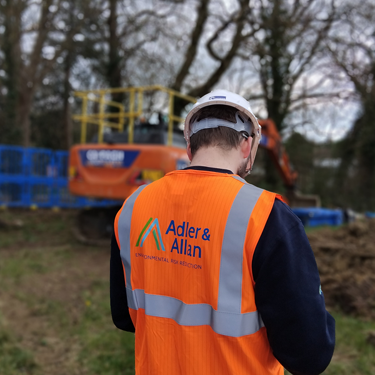
Preliminary ecological appraisal
Before any land development begins, understanding the ecological value of your site is essential. A Preliminary Ecological Appraisal (PEA) is the first step in identifying habitats, protected species, and potential ecological constraints.
Our expert ecologists conduct thorough desk studies and site walkovers to assess biodiversity risks and opportunities, helping you make informed decisions and meet planning requirements.
Our PEAs provide clear, actionable insights, including mitigation recommendations and guidance on further surveys.
Whether you're planning housing, infrastructure, or responding to an environmental incident, our assessments ensure your project aligns with UK wildlife legislation and biodiversity net gain policies.
With our support, you can move forward confidently, knowing your development is ecologically sound and legally compliant.
What is a PEA?
A Preliminary Ecological Appraisal (PEA), sometimes referred to as an Extended Phase 1 Habitat Survey or Phase 1 Ecology Survey, is used to assess the ecological value of a site and potential impacts from development.
The appraisal comprises of an assessment to identify features of ecological interest on-site or within the vicinity of the site to understand the potential ecological impacts that may be caused by a proposed project.
It identifies ecological constraints, recommends mitigation measures, and determines if further surveys are needed.
Why choose Adler & Allan?
Accredited experts
We have CIEEM-accredited ecologists with extensive terrestrial and protected species expertise
Specialist capability
We are licensed by Natural England to conduct specialist surveys
Advanced technology
We use UKHab mapping for accurate habitat classification
Effective reporting
Clear, concise reporting tailored to planning requirements
Holistic support
End-to-end ecological capability, from PEA to EcIA and beyond
What is the PEA process?

Desk Study

Site walkover (extended phase 1 survey)

Impact identification

Recommendations

Reporting
The added value of a PEA
A PEA delivers critical early-stage insights that:
- Support planning applications with evidence-based ecological data
- Identify risks early, avoiding delays and unexpected costs
- Ensure legal compliance with UK and international wildlife legislation
- Highlight opportunities for biodiversity enhancement and net gain
- Guide project design to minimise ecological impact
Key components of a PEA:
Ecological desk study
This involves gathering existing ecological information about the site and surrounding area from various sources. This may include:
- Reviewing biological records from local record centres.
- Consulting online resources like maps and satellite imagery.
- Identifying legally protected sites, priority habitats, and sites of special scientific interest.
- Researching previous ecological surveys and reports.
Extended phase 1 habitat survey
This field survey involves a walkover of the site to map habitats, identify plant species, and assess their potential to support protected species. This may involve:
- Mapping and describing different habitat types.
- Identifying plant species and assessing their abundance.
- Searching for evidence of protected species (e.g., signs of badgers, bats, reptiles).
- Assessing the potential of habitats to support protected species.

PEA report
The findings of the desk study and site visit are compiled into a report that includes:
- A description of the survey methodology.
- Details of the habitats and species found on site.
- An assessment of the ecological value of the site.
- Identification of potential ecological constraints and impacts.
- Recommendations for mitigation measures and further surveys.
- Relevant legislation and planning policy.
A PEA helps inform developers about potential ecological issues early in the planning process, allowing for informed decision-making and the development of appropriate mitigation strategies.
The assessment includes:
- A desk study to provide background data and context.
- A walkover of the site to classify and map the habitat types that are present.
- Looking for evidence of potential protected species within or adjacent to the site.
A PEA can be undertaken at any time of the year, although the optimal time for the survey is from April to September, inclusive.
The objectives of a PEA are to identify:
- Potential ecological constraints in relation to the proposed project
- The need for further ecological surveys
- Any mitigation measures which may be required
- Opportunities for ecological enhancement within the proposals
PEA’s are important as they help to identify and evaluate any features of ecological interest on a proposed development site. This identification is often required before planning applications can be submitted, as it can help ensure any mitigation measures are put in place before a proposed project is signed off.
Certain species and habitats are protected by UK and International Law; therefore, any potential impact needs to be mitigated in line with the exiting wildlife legislation and planning policies in place, be that national or local. Planning policies also detail the requirement for a net gain in biodiversity on proposed development sites.
A PEA includes:
- Details of the methodology used and any limitations encountered
- Experience and credentials of those undertaking the appraisal
- Results and interpretation of the desk study
- Results of the site visit, including UK Habs mapping Identification of the potential impacts on features of ecological importance and recommendations for avoidance, mitigation, or compensation, where appropriate
- Identification of the requirement for a further survey, where appropriate
- Recommended ecological enhancements
- Details of relevant legislation and planning policy.
The planning process
Our specialist terrestrial ecologists assess your sites through a Preliminary Ecological Appraisal (PEA). This ecological walk over of your site records habitats and the potential for habitats to support protected and notable species of wildlife and plants. Following this a report on the potential ecological impact of the planned development with recommendations is issued including information on any protected species surveys conducted. This is called an Ecological Impact Assessment (EcIA).
Ready to assess your site?
Our trained ecologists are here to help you navigate the planning process with confidence. Contact us today to book your Preliminary Ecological Appraisal.
Contact us
